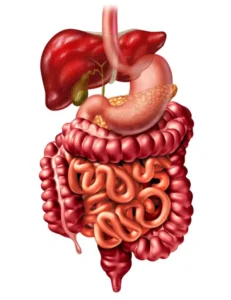Supplements for digestive health play a crucial role in maintaining overall wellness and optimizing the function of your digestive system. The gut is not only central to digesting food but also impacts various aspects of health, including immune function, mental health, and chronic disease management. Understanding the significance of a healthy digestive system can help you appreciate why nurturing it with the right supplements is vital.
Table of Contents
ToggleKey Supplements for Digestive Health

To effectively support your digestive system, it’s important to incorporate certain key supplements for digestive health into your routine. Here’s a detailed list of the most beneficial supplements:
- Probiotics: These are live bacteria that help maintain the balance of good bacteria in the gut. They aid in digestion, improve gut health, and enhance immune function. Common sources include yogurt, kefir, and supplements in capsule or powder form.
- Prebiotics: Acting as food for probiotics, these fibers help nourish and support the growth of healthy gut bacteria. Foods rich in prebiotics include bananas, onions, and garlic, though supplements are also available for a more concentrated dose.
- Digestive Enzymes: These are essential for breaking down food into nutrients that your body can absorb. Supplements may include amylase (for starch), lipase (for fats), and protease (for proteins).
- Fiber Supplements: Fiber aids in regular bowel movements and helps maintain bowel health. Options like psyllium husk are popular for their effectiveness in improving gut movement and can be found in both food and supplement form.
- Vitamin D: Supports the immune system and has anti-inflammatory effects on the digestive tract. Vitamin D can be obtained from sun exposure, foods like fatty fish, or supplements.
- Ginger and Turmeric (Curcumin): Known for their anti-inflammatory properties, these can help reduce gastrointestinal irritation. Supplements are available if dietary intake is insufficient.
- Apple Cider Vinegar: Though evidence is mixed, some suggest it can benefit the gut microbiome. Typically used in liquid form but also available in capsules.
- Glutamine: An amino acid that supports the integrity of the gut lining and may aid in reducing intestinal inflammation.
Integrating these supplements for digestive health can significantly enhance your gastrointestinal health and contribute to overall well-being.
Understanding Digestive Enzymes

Digestive enzymes are crucial for the proper breakdown of food into nutrients that the body can utilize. What you ought to know about them is as follows:
- Types of Digestive Enzymes:
- Amylase:Reduces carbs to sugars so the body can absorb them more readily.
- Lipase: Responsible for fat breakdown, making it easier to digest and utilize fats.
- Protease: Helps in protein digestion by breaking them down into amino acids.
- Sources: While the body naturally produces these enzymes, certain conditions can lead to deficiencies. Supplements for digestive health can be beneficial in such cases. These supplements are available in various forms, including capsules and chewable tablets.
- Common Conditions:
- Lactose Intolerance: Low amounts of the enzyme lactase cause lactose intolerance, which is the inability to digest lactose.
- Pancreatic Insufficiency: Inadequate synthesis of digestive enzymes by the pancreas.
- Celiac Disease: Gluten causes an immune response that damages the lining of the small intestine, affecting enzyme production.
Supplementing with digestive enzymes can aid those with specific dietary limitations or deficiencies, enhancing nutrient absorption and reducing gastrointestinal discomfort.
Enhancing Gut Health Through Diet
For intestinal health to remain at its best, diet is essential. Here are some dietary recommendations that can support your gastrointestinal health, along with the use of supplements for digestive health:
- High-Fiber Foods:
- Fruits: Apples, bananas, oranges, and berries.
- Vegetables: Broccoli, leafy greens, and carrots.
- Whole Grains: Oats, whole wheat, and brown rice.
- Legumes: Beans, lentils, and chickpeas.
- Fermented Foods: These include yogurt, kefir, sauerkraut, and kimchi, which enhance the diversity and health of your gut microbiome.
- Lean Proteins: Incorporating lean meats, fish, and plant-based proteins can improve gut health without overburdening the digestive system.
- Avoid Processed Foods: Minimizing intake of high-fat and highly processed foods can reduce the risk of gastrointestinal discomfort and promote a healthier gut flora.
- Stay Hydrated: Drinking plenty of water is essential for digestive health as it helps dissolve fats and soluble fiber, allowing these substances to pass through the intestines more easily.
Implementing these dietary habits along with the appropriate supplements for digestive health can significantly improve your digestion and overall health.
Supplemental Forms and Recommendations

Choosing the right forms and understanding the recommendations for supplements for digestive health can optimize their effectiveness. Here are key considerations:
- Forms of Supplements:
- Capsules and Pills: Easy to consume and often specifically dosed.
- Powders: Can be mixed with liquids; beneficial for those who have difficulty swallowing pills.
- Chewables: A good option for children or adults who prefer not to swallow pills.
- Liquids: Ideal for rapid absorption and those with digestive issues that affect solid supplement digestion.
- Guidelines for Choosing Supplements:
- Identify Needs: Based on dietary restrictions, health conditions, and specific digestive issues.
- Quality and Purity: Opt for supplements that are third-party tested for quality and purity.
- Specific Strains and Strengths: Particularly important for probiotics; different strains offer different benefits.
- Vegan and Gluten-Free Options:
- Many supplements for digestive health are now available in vegan and gluten-free forms to cater to those with specific dietary restrictions.
- Consulting Healthcare Professionals:
- Always consult with a healthcare provider before starting any new supplement to ensure it aligns with your health needs and current medications.
Incorporating these supplements for digestive health following the recommended guidelines ensures you receive the maximum benefits tailored to your specific health requirements.
Safety and Regulatory Considerations

When incorporating supplements for digestive health into your regimen, it is crucial to understand the safety and regulatory considerations:
- FDA Regulation:
- Dietary supplements, including supplements for digestive health, are not strictly regulated by the FDA like prescription medications. Before their products are released onto the market, manufacturers are accountable for making sure they are safe.
- Potential Side Effects:
- While generally safe, some supplements can cause side effects, especially when not used as directed. Common side effects may include gastrointestinal upset, allergic reactions, or interactions with other medications.
- Always start with a lower dose to monitor your body’s response.
- Importance of Dosage Control:
- Follow the recommended dosages on the product label or those provided by a healthcare professional.
- Overuse can lead to adverse effects or diminish the benefits of the supplements.
- Consulting Healthcare Professionals:
- Always discuss with a healthcare provider before beginning any new supplement to avoid potential interactions with existing medications and to ensure the supplement is appropriate for your specific health conditions.
- Choosing Quality Products:
- Look for products that have been verified by third-party organizations such as USP (United States Pharmacopeia) or NSF International, which test for quality and purity.
By adhering to these guidelines, you can safely and effectively use supplements for digestive health to enhance your gut health and overall wellness.
Read Also:
